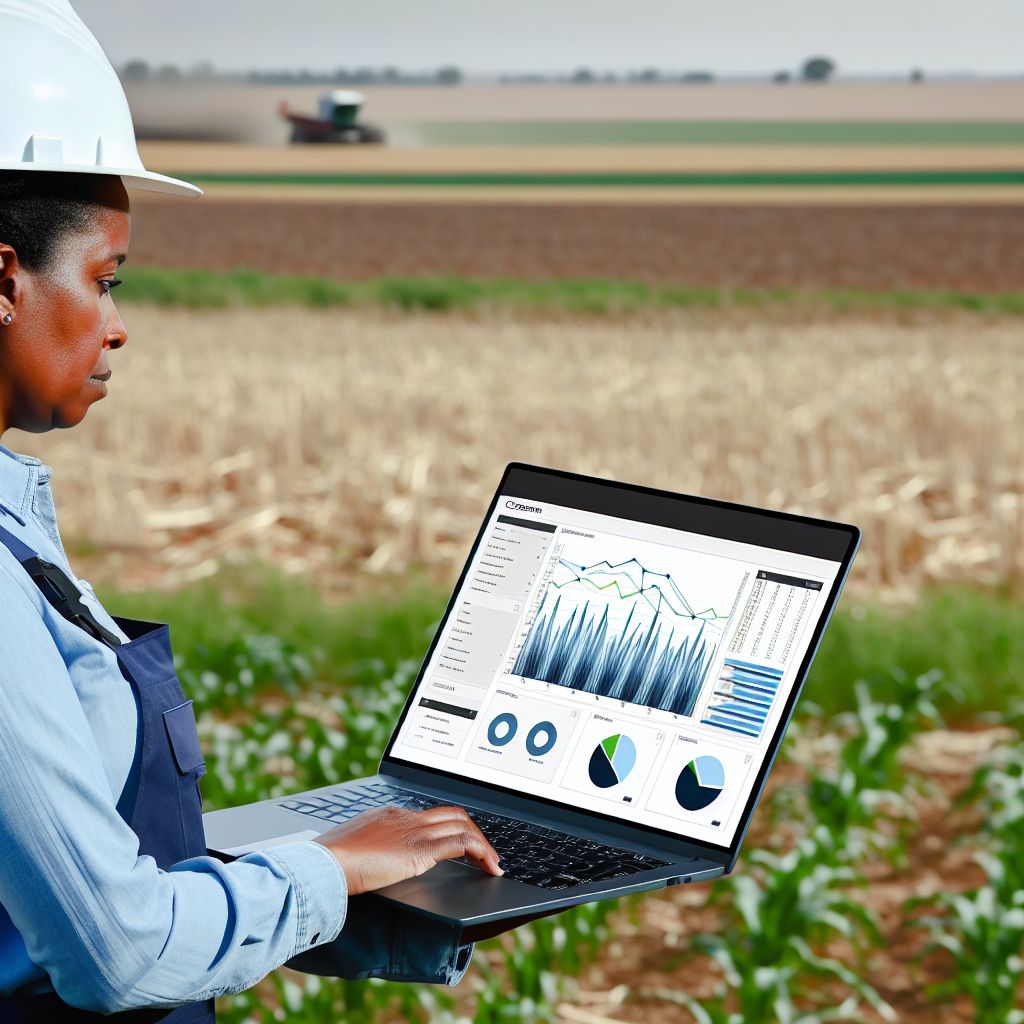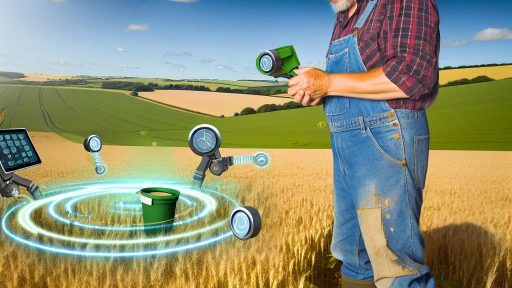Understanding the Importance of Security in Farm Management Software
Protecting Sensitive Data
Farm management software often handles sensitive information.
This data includes financial records and operational details.
By prioritizing security, farmers protect their business interests.
Furthermore, compromised data can lead to significant financial losses.
Maintaining Operational Integrity
Security breaches can disrupt farm operations.
When management software is compromised, critical functions may fail.
Ensuring robustness in software aids in maintaining consistent operations.
Farmers need reliable software to manage seasonal tasks effectively.
Staying Compliant with Regulations
Compliance is essential in the agricultural sector.
Farm management software must adhere to data protection laws.
This compliance helps avoid legal penalties and fines.
Moreover, it fosters trust among clients and partners.
Building Trust with Stakeholders
Clients and partners expect robust security measures.
Transparent security practices build stronger relationships.
A farm’s reputation is closely linked to its data protection efforts.
Transform Your Agribusiness
Unlock your farm's potential with expert advice tailored to your needs. Get actionable steps that drive real results.
Get StartedInvesting in secure software enhances stakeholder confidence.
Mitigating Risk of Cyber Threats
Cyber threats are increasingly targeting the agricultural sector.
Farm management software faces risks from malicious attacks.
Vigilance is essential to protect against evolving threats.
Regular software updates improve defenses against potential vulnerabilities.
Ensuring Data Backup and Recovery
A reliable backup system is crucial for safeguarding data.
In the event of a breach, recovery protocols must be clear.
Farm management software should include automated backup features.
This capability minimizes data losses and downtime.
Key Security Features to Look for in Farm Management Software
Data Encryption
Data encryption protects sensitive information from unauthorized access.
It ensures that data remains confidential during transmission.
Look for software that uses strong encryption standards, such as AES-256.
End-to-end encryption provides an extra layer of security.
User Authentication
User authentication secures accounts from unauthorized access.
Multi-factor authentication enhances security significantly.
Choose software that allows strong password policies.
Regular password updates can also reduce vulnerabilities.
Data Backup and Recovery
Regular data backups prevent data loss in case of system failures.
Ensure the software offers automated backup solutions.
Inquire about the recovery process to restore lost data efficiently.
Cloud backups can provide additional safety and accessibility.
Access Controls
Access controls limit user permissions based on roles.
This approach protects sensitive information from inappropriate access.
Customizable permissions ensure only authorized users have access.
Showcase Your Farming Business
Publish your professional farming services profile on our blog for a one-time fee of $200 and reach a dedicated audience of farmers and agribusiness owners.
Publish Your ProfileRegular audits of access logs help identify potential security breaches.
Security Updates and Support
Regular security updates are crucial for protecting against threats.
Choose software from providers who promptly address vulnerabilities.
Check for ongoing support services to assist with security issues.
Responsive customer support can be invaluable during security incidents.
Compliance with Regulations
Ensure the software complies with relevant agricultural regulations.
Compliance helps avoid legal penalties and enhances data security.
Understand how the software handles compliance documentation.
A reputable provider should stay informed about regulatory changes.
Evaluating Data Encryption Practices of Software Providers
Importance of Data Encryption
Data encryption safeguards sensitive information from unauthorized access.
It transforms readable data into an unreadable format.
This process ensures that even if data gets intercepted, it remains secure.
Consequently, choosing a software provider with strong encryption practices is essential.
Types of Encryption to Consider
Different encryption methods provide varying levels of security.
Take note of both symmetric and asymmetric encryption techniques.
Symmetric encryption uses the same key for both encryption and decryption.
Meanwhile, asymmetric encryption employs a pair of keys for security.
Additionally, consider whether the software uses end-to-end encryption.
Regulatory Compliance and Standards
Ensure the provider adheres to industry standards for encryption.
Look for compliance with regulations like GDPR or HIPAA.
Such compliance indicates that the software meets established security guidelines.
Furthermore, ask about certifications relevant to data encryption practices.
Evaluating Encryption Protocols
Investigate the encryption protocols used by the software provider.
Commonly adopted protocols include AES and RSA.
The Advanced Encryption Standard (AES) is widely recognized for its security.
On the other hand, RSA is notable for secure key exchanges.
Inquire about the key lengths used, as longer keys typically enhance security.
Assessing Provider Transparency
Transparency about encryption practices can build trust with users.
Check if the provider publishes regular security audits or reports.
A responsible provider should offer clear information about their encryption technologies.
Moreover, assess their response plan for potential data breaches.
Feedback and Reviews
Research customer feedback regarding the provider’s encryption reliability.
Look for reviews that specifically mention data security and encryption.
Additionally, join forums or community discussions about the software.
Such insights can help you gauge overall reliability and security performance.
See Related Content: Ethical Considerations In Agricultural Biotechnology
Assessing User Access Controls and Role-Based Permissions
Understanding Access Control
Access control is crucial for farm management software.
This security feature regulates who can view or use information.
Implementing effective access control protects sensitive data.
Different levels of access should match user roles.
Showcase Your Farming Business
Publish your professional farming services profile on our blog for a one-time fee of $200 and reach a dedicated audience of farmers and agribusiness owners.
Publish Your ProfileRole-Based Permissions Explained
Role-based permissions enhance data security by restricting access.
Users receive permissions based on their job functions.
This limits exposure to sensitive information.
For example, employees in finance need different access than field workers.
Evaluating User Roles
Carefully evaluate user roles during software selection.
Identify essential tasks each role requires access to complete.
Consider potential user role changes in the future.
Flexibility in role assignments can benefit your operation.
Implementing Access Control Policies
Establish clear access control policies for all users.
Include guidelines on data access, sharing, and security measures.
Regularly review and update these policies as needed.
Ensure all users are trained on these protocols.
Monitoring Access to Data
Continuous monitoring of access is necessary for security.
Log access attempts to identify unusual activity patterns.
Audits help ensure compliance with security policies.
Regular assessments prevent unauthorized access effectively.
Using Security Features in Software
Choose farm management software that offers robust security features.
Features to consider include two-factor authentication and data encryption.
Prioritize software with customizable access controls.
This flexibility allows adjustments to user permissions over time.
Learn More: Leveraging Digital Finance Tools To Boost Agricultural Productivity
Looking into Compliance with Agricultural Data Protection Regulations
Understanding Agricultural Data Protection
Agricultural data protection encompasses laws safeguarding farmers’ information.
These regulations vary by country and region.
Understanding them is crucial for choosing effective farm management software.
Key Regulations to Consider
Some important regulations include the General Data Protection Regulation (GDPR).
GDPR impacts how data is collected and stored within the EU.
Additionally, the U.S. has the Health Insurance Portability and Accountability Act (HIPAA) concerning health data.
Farmers should also consider the California Consumer Privacy Act (CCPA).
This law allows consumers to control personal information companies collect.
Assessing Software Compliance
When selecting farm management software, verify compliance with relevant regulations.
Begin by reviewing the software provider’s privacy policy.
It should clearly state data collection, usage, and storage practices.
Moreover, check if the software offers data encryption features.
Encryption protects sensitive information during transmission and storage.
Evaluating User Rights and Data Access
Understand your rights regarding your data when using new software.
Ensure you have the ability to access your data easily.
Furthermore, examine options for data deletion if necessary.
This capability is essential for compliance with many data regulations.
Security Features to Prioritize
Select software that offers robust security measures.
Look for multi-factor authentication for user access.
Showcase Your Farming Business
Publish your professional farming services profile on our blog for a one-time fee of $200 and reach a dedicated audience of farmers and agribusiness owners.
Publish Your ProfileThis adds an important layer of security.
Regular software updates also enhance security, addressing vulnerabilities promptly.
Consultation with Legal Experts
Consult with legal experts familiar with agricultural data laws.
They can help you navigate complex regulations effectively.
Additionally, keeping abreast of changing laws enhances compliance.
This proactive approach can prevent costly legal issues in the future.
See Related Content: Maintenance Tips For Agricultural Automated Machinery
Reviewing Software Provider’s History of Data Breaches and Incident Response
Importance of Provider’s Security Track Record
Choosing farm management software requires careful assessment of the provider’s security history.
A history of data breaches can indicate vulnerabilities in the software.
Furthermore, understanding how a provider has handled past incidents is crucial.
A strong incident response can mitigate potential damage and rebuild trust.
Investigating Past Data Breaches
Start by researching any reported data breaches involving the provider.
Look for details on when these breaches occurred and their impact.
For example, a significant breach in 2021 at GreenField Software left many users at risk.
Evaluating the scale and frequency of breaches gives insights into the provider’s security measures.
Assessing Incident Response Strategies
Examine how the provider responded to previous security incidents.
Did they promptly notify affected users about the breach?
Effective communication during a breach demonstrates accountability and transparency.
Moreover, assess whether they implemented measures to prevent future breaches.
For instance, RapidAgri reported a major incident but quickly adapted their security protocols.
Seeking Third-Party Reviews
Look for independent security audits or assessments of the software provider.
Reports from cybersecurity firms can shine a light on potential risks.
User reviews can also provide valuable insights into experiences with security issues.
Platforms like Trustpilot often feature feedback related to security performance.
Engaging with the Provider
Don’t hesitate to ask the provider about their security practices directly.
Inquire about their policies for data encryption and user access controls.
Understanding their approach to vulnerability management is essential.
Ask for examples of how they have improved their systems after a breach.
Security Considerations When Selecting a Provider
Prioritize a provider’s security track record when selecting farm management software.
A thorough review can protect your farm data from potential threats.
A good provider values your data as much as you do.
You Might Also Like: Benefits Of Drones For Precision Agriculture

Importance of Regular Software Updates and Security Patch Management
Understanding Software Vulnerabilities
Software vulnerabilities expose systems to potential threats.
Hackers exploit these weaknesses to gain unauthorized access.
Thus, regular updates help mitigate these risks effectively.
The Role of Security Patches
Security patches address known vulnerabilities in software.
They enhance overall system security and stability.
Deploying these patches promptly minimizes potential risks.
The Benefits of Regular Updates
Regular updates improve software functionality and performance.
They introduce new features that enhance user experience.
Showcase Your Farming Business
Publish your professional farming services profile on our blog for a one-time fee of $200 and reach a dedicated audience of farmers and agribusiness owners.
Publish Your ProfileAdditionally, updates often fix bugs and glitches proactively.
Establishing an Update Schedule
Creating a structured schedule for updates is crucial.
This approach ensures timely implementation of improvements.
Set reminders to check for updates and patches regularly.
Choosing the Right Farm Management Software
When selecting software, evaluate the vendor’s update policy.
Reliable vendors consistently provide updates and patches.
Consider user reviews and experiences regarding update frequency.
Training Staff on Software Updates
Training staff on the importance of updates is essential.
Awareness helps mitigate risks associated with outdated software.
Encourage staff to report any issues related to software performance.
Monitoring Software Performance
Regularly monitor software performance for discrepancies.
Identify any vulnerabilities that may arise after updates.
Address these issues quickly to maintain security and efficiency.
Exploring Compatibility with Existing Security Measures on the Farm
Assessing Current Security Protocols
Start by evaluating the existing security measures on your farm.
Identify any hardware or software currently in use.
Understand the strengths and weaknesses of these security protocols.
Discuss with your team to gather insights on security issues.
This assessment helps highlight gaps that new software must address.
Ensuring Integration with Existing Systems
Choose farm management software that integrates seamlessly with current systems.
Verify that it supports common security protocols your farm uses.
This will facilitate data exchange without compromising security.
Consult with software providers about integration capabilities.
Look for solutions that offer API access for better security connections.
Reviewing Data Protection Features
Data protection is critical when selecting new software.
Ensure the software includes encryption for sensitive data.
Look for user authentication features to secure data access.
Consider software that offers regular backups and recovery options.
Evaluate options for two-factor authentication for added security.
Compliance with Regulatory Standards
Verify that the software complies with industry regulations.
Understand local regulations regarding data privacy and security.
Ensure the software provider follows best practices for data handling.
This compliance is essential for avoiding legal issues in the future.
Training Employees on New Security Protocols
Implement training programs for staff on new security measures.
Ensure everyone understands how to use the new software securely.
Regular refreshers can help reinforce good practices.
Encourage reporting any security concerns promptly.
A knowledgeable team is crucial for maintaining farm security.
Guidelines for Secure Data Backup and Recovery Processes
Importance of Regular Backups
Regular backups safeguard against data loss.
They protect critical information from hardware failures.
Additionally, backups minimize risks from cyber threats.
Showcase Your Farming Business
Publish your professional farming services profile on our blog for a one-time fee of $200 and reach a dedicated audience of farmers and agribusiness owners.
Publish Your ProfileChoosing the Right Backup Method
Select a backup method that suits your needs.
Common options include cloud storage and external hard drives.
Cloud storage offers accessibility and scalability.
External hard drives provide physical security and control.
Implementing Encryption
Encryption protects sensitive data from unauthorized access.
Use strong encryption protocols during backup processes.
Ensure data remains secure both in transit and at rest.
Establishing a Backup Schedule
Create a consistent backup schedule for your data.
Daily backups often provide the best protection.
Regular intervals ensure the most recent data is saved.
Testing Recovery Processes
Regularly test your backup recovery procedures.
This practice identifies potential issues before they arise.
Performing test recoveries enhances overall reliability.
Documenting Backup Procedures
Clearly document your backup processes and protocols.
Include steps for both backups and restorations.
A well-documented plan improves team efficiency during crises.
Training Staff on Data Management
Providing training increases awareness about data security.
Educate staff on risks and best practices for backups.
Regular training fosters a culture of security within your organization.
Monitoring and Updating Backup Systems
Regularly monitor your backup systems for any issues.
Keep backup software updated to protect against vulnerabilities.
Reassess your backup strategy annually to ensure it meets current needs.




